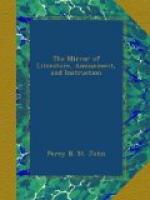In the reign of Henry III., Warwick Castle was of such importance, that security was required from Margery, the sister and heiress of Thomas de Newburgh, the sixth earl of the Norman line, that she would not marry with any person in whom the king could not place the greatest confidence. During the same reign, in the year 1265, William Manduit, who had garrisoned the castle on the side of the king against the rebellious barons, was surprised by John Gifford, the governor of Kenilworth Castle, who, having destroyed a great part of the walls, took him, together with the countess, his wife, prisoners; and a ransom of nineteen hundred marks were paid, before their release could be obtained. The last attack which it sustained was during the civil wars in the seventeenth century, when it was besieged for a fortnight, but did not surrender.
Few persons have made a greater figure in history than the earls of Warwick, from the renowned
—— Sir Guy of Warwicke, as was weten In palmer wyse, as Colman hath it wryten; The battaill toke on hym for Englandis right, With the Colbrond in armes for to fight.[4]
up to the accomplished Sir Fulk Greville, to whom the castle, with all its dependencies, was granted by James I., after having passed through the successive lines of Beauchamp, Neville, Plantagenet, and Dudley.
L.L.
[4] Hardynge’s “Chronicle,” p, 211, edit. 1812.
* * * * *
ODE TO THE LONDON STONE.
(For the Mirror.)
Mound of antiquity’s dark hidden
ways,
Though long thou’st
slumber’d in thy holy niche,
Now, the first time, a modern bard essays
To crave thy primal use, the
what and which!
Speak! break my sorry ignorance asunder!
City stone-henge, of aldermanic
wonder.
Wert them a fragment of a Druid pile,
Some glorious throne of early
British art?
Some trophy worthy of our rising isle,
Soon from its dull obscurity
to start.
Wert thou an altar for a world’s
respect?
Now the sole remnant of thy fame and sect.
Wert thou a churchyard ornament, to braid
The charnel of putridity,
and part
The spot where what was mortal had been
laid,
With all thy native coldness
in his heart?
Thou sure wert not the stone—let
critics cavil!—
Of quack M.D. who lectur’d on the
gravel.
Did e’er fat Falstaff, wreathing
’neath his cup
Of glorious sack, unable to
reel home,
Sit on thy breast, and give his fancy
up,
The all that wine had given
pow’r to roam,
And left the mind in gay, but dreamy talk,
Wakeful in wit when legs denied to walk?
Did e’er wise Shakspeare brood upon
thy mass,
And whimsey thee to any wondrous
use
Of sage forefathers, in his verse to class
That which a worse bard had
despis’d to choose,
Unconscious how the meanest objects grow,
Giants of notice in the poet’s show?




